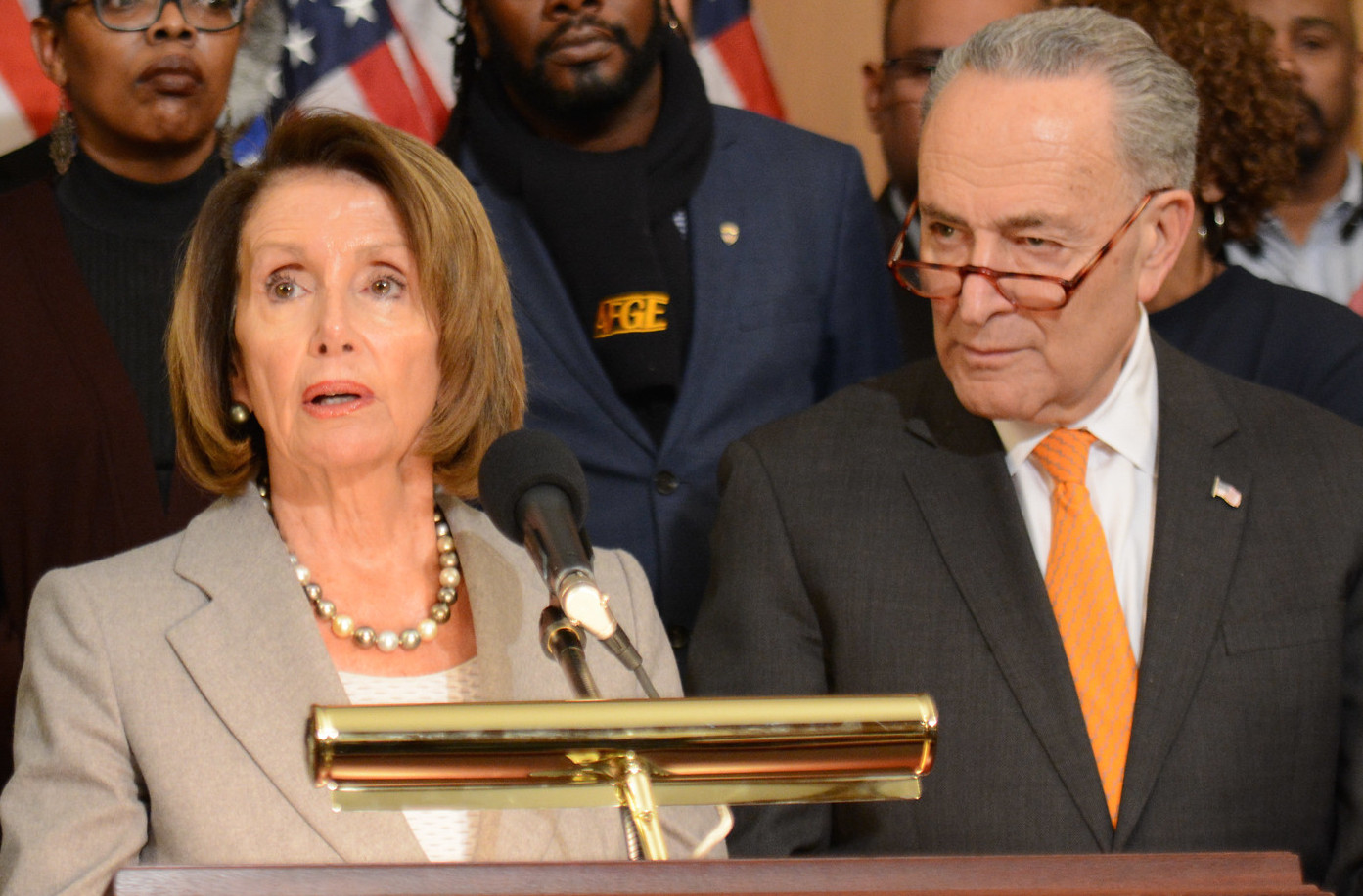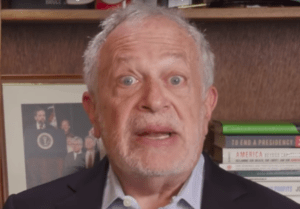Why Are Democrats So Scared of Impeachment?
Congressional party leaders’ reticence to impeach Trump has more to do with poll number predictions than much-needed justice. House Majority Leader Nancy Pelosi and Senate Minority Leader Chuck Schumer. (AFGE / CC BY 2.0)
House Majority Leader Nancy Pelosi and Senate Minority Leader Chuck Schumer. (AFGE / CC BY 2.0)
Editor’s Note: This is the second installment of a two-part series examining the relationship between President Donald Trump and Attorney General William Barr, and the challenges their assertions of extreme executive authority pose to Congress. Read the first part here.
Why haven’t congressional Democrats moved to impeach Donald Trump? Is their failure to act due to an inexcusable lack of courage and political will, or is the inaction attributable to an understandable fear of failure?
The answer, unfortunately, is a bit of both. Given the president’s thoroughgoing corruption and reckless disregard for the rule of law, impeachment is imperative.
But impeachment is a two-step process, and that’s where the fear sets in. Even if the current Democratic majority in the House votes to impeach Trump, there is little prospect that the Senate will convict the president and remove him from office following an impeachment trial conducted in the upper chamber.
Sooner rather than later, Democrats will have to find the fortitude to set aside their fears. The president and his new attorney general, William Barr, are daring them to initiate impeachment proceedings, refusing to comply with congressional subpoenas and document requests seeking, among other items, Trump’s tax returns, and the full, unredacted report by special counsel Robert Mueller.
As New York Times reporters Peter Baker, Maggie Haberman and Michael Schmidt recently noted, “As the White House and Congress escalate their constitutional showdown, President Trump and his team are essentially trying to call what they see as the Democrats’ bluff. The message: Put up or shut up. Impeach or move on.”
On May 15, White House counsel Pat Cipollone upped the ante in a letter to House Judiciary Committee Chairman Jerrold Nadler, D-N.Y., in response to the committee’s request for additional information related to the Mueller probe. Cipollone threatened to invoke executive privilege to block the committee’s demands for documents. He also threatened to block the committee’s efforts to summon testimony from current and past administration officials.
Contending that the committee’s demands violate “the separation of powers and the constitutional prerogatives of the President,” and alleging that Trump had fully cooperated with the special counsel, Cipollone wrote:
Congressional investigations are intended to obtain information to aid in evaluating potential legislation, not to harass political opponents. … The Committee’s requests repeatedly run afoul of the Constitution by encroaching upon authorities that the Constitution assigns exclusively to the Executive Branch. These requests have no legitimate legislative purpose and exceed Congress’s limited authority.
If any of this sounds familiar, it’s because it has happened before. On May 22, 1974, President Richard Nixon, faced with House subpoenas seeking the infamous secret Watergate tape recordings, penned a similar letter to then-House Judiciary Committee Chairman Peter Rodino, D-N.Y., protesting:
Thus it is clear that the continued succession of demands for additional Presidential conversations has become a never-ending process, and that to continue providing these conversations in response to the constantly escalating requests would constitute such a massive invasion into the confidentiality of Presidential conversations that the institution of the Presidency itself would be fatally compromised.
Nixon refused to turn over the tapes, not only to the House, but also to special prosecutor Leon Jaworski, sparking a legal battle that went all the way to the Supreme Court (United States v. Nixon), which Nixon lost. Shortly thereafter, he resigned.
The current Democratic leadership, guided by Majority Leader Nancy Pelosi of California, fears that a Trump impeachment will more closely resemble the failed campaign to remove President Bill Clinton from office than the successful effort against Nixon. After his impeachment by the House in 1998, Clinton’s public approval rating spiked 10 points, to an astounding 73%. Clinton was subsequently acquitted by the Senate and served out the remainder of his second term.
Pelosi’s impeachment trepidations are not unfounded. Although Trump’s overall approval rating remains mired in the 42% range, she and other top Democrats believe that even a modest post-impeachment boost for Trump could prove decisive in the 2020 election.
The truth, of course, is that no one actually knows how impeachment would affect Trump’s popularity or the next election. Given the scope of his malfeasance, impeachment proceedings may well cause his approval ratings to plummet, replicating Nixon’s demise. Nixon began his second term with a lofty approval rating of 68%. But by August 1974—following Senate and House hearings, respectively, on Watergate and impeachment, and the Supreme Court’s ruling on the White House tapes—57% of Americans thought Nixon should be removed from office.
In the end, the decision to impeach Trump shouldn’t be based on predictions about poll numbers, however worrying they may be. It should be rooted in principle.
Like all of his predecessors, Trump took an oath on Inauguration Day pursuant to Article I, Clause 3 of the Constitution to “take care” that the laws of the nation be faithfully executed.
Trump has violated that oath in myriad ways, by:
● Defying the oversight authority of Congress.
● Attempting to obstruct the Mueller investigation.
● Using the presidency to enrich himself, his family and the Trump Organization in violation of the Constitution’s “emoluments clause.”
● Refusing to defend the Affordable Care Act, imperiling the health insurance available to millions of Americans.
● Undermining environmental protections and pulling out of the Paris Climate Agreement, endangering the health and safety of generations.
● Reneging on the Iran nuclear deal, bringing the nation to the brink of another war in the Middle East.
● Refusing to enforce the Voting Rights Act, promoting voter suppression and sowing racial hatred and resentments.
● Promising tax relief for middle-class and working families, but sponsoring a massive giveaway to the superrich.
● Incarcerating undocumented children in cages, and declaring a national emergency to fund his border wall.
Through it all, he has lied incessantly about these and other misdeeds, much as Nixon lied about Watergate. Nixon was cited for deceiving the public in the Articles of Impeachment ratified by the House Judiciary Committee in 1974. Trump should be as well.
All things considered, the real issue is not whether Trump should be impeached, but when and how impeachment should unfold.
As for when, there is no better time than the present. Trump and Barr show no signs of relenting in their crusade to expand presidential power. The sooner they are put on the defensive, the better.
As for how, the gravity and breadth of Trump’s derelictions warrant lengthy and public hearings before the House Judiciary Committee. Congress’ authority to subpoena documents and witnesses is at its greatest in impeachment proceedings. In those proceedings, we should hear from constitutional scholars, and such key witnesses as Robert Mueller and former White House counsel Don McGahn. We should also hear from scores of ordinary Americans who have been victimized by Trump’s misconduct.
In the Senate, the House would be represented by a team of managers who would present the case against Trump. Supreme Court Chief Justice John Roberts would preside.
Among other demands, the managers should request a trial in open session in the well of the Senate—something that hasn’t happened since the impeachment trial of Andrew Johnson in 1868. This would expose Trump’s “high crimes and misdemeanors” for all the world to see, even if House managers do not ultimately prevail in the Senate. If the trial is properly handled, Trump’s reelection prospects should tumble.
As Alexander Hamilton postulated in Federalist Paper No. 65, impeachment is the constitutional remedy for the removal of federal officials for behavior that violates the “public trust.” Our 45th president has long exceeded that critical threshold.
All that’s left is for the Democrats to take a shot of courage, stop wringing their hands and start wielding their gavels.
Your support matters…Independent journalism is under threat and overshadowed by heavily funded mainstream media.
You can help level the playing field. Become a member.
Your tax-deductible contribution keeps us digging beneath the headlines to give you thought-provoking, investigative reporting and analysis that unearths what's really happening- without compromise.
Give today to support our courageous, independent journalists.








You need to be a supporter to comment.
There are currently no responses to this article.
Be the first to respond.